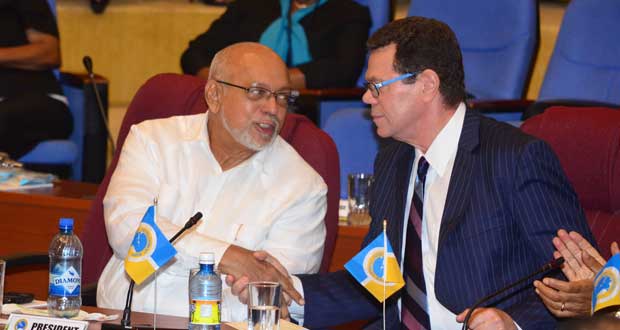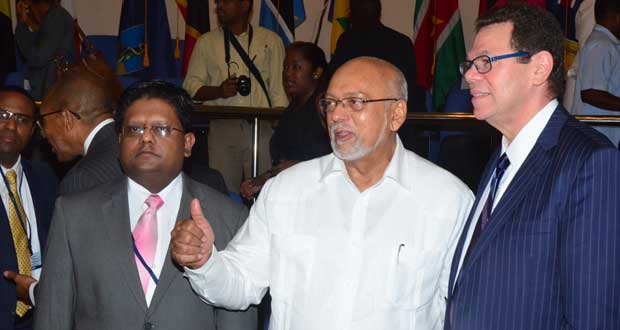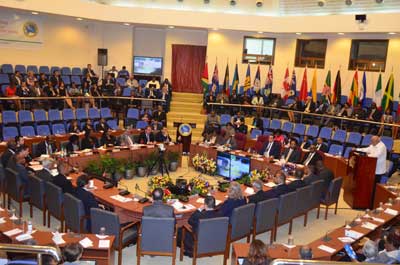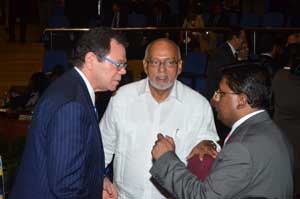
President Donald Ramotar, left, exchanges a handshake with President of the CDB, Dr. Warren Smith, after he delivered an address in which he (Smith) stressed Guyana’s huge potential for economic benefits through the development of hydropower (Adrian Narine photo)
CDB President advances wide ranging regional energy proposals
PRESIDENT of the Caribbean Development Bank (CDB), Dr. William Warren Smith, has acknowledged the role of renewable energy in unlocking opportunities for competitiveness and growth in the Region.

CDB President, Warren Smith, during his presentation to the opening session of the 44th annual CBD Board of Governors meeting (Adrian Narine photo)
Speaking at yesterday’s opening of the 44th annual CDB Board of Governors meeting, in the Guyana International Conference Centre (GICC), Liliendaal, Greater Georgetown, he emphasised Guyana’s huge potential for economic benefits through the development of hydropower.
“Guyana alone has enough renewable energy potential, mainly in the form of hydropower to meet all of its electricity requirements for the foreseeable future, supply all of the needs of immediate neighbours, Grenada and Trinidad and Tobago, and still have enough left over to sell to neighbouring Brazil,” Dr. Smith said.
Slated to be this nation’s most ambitious undertaking, the Amaila Falls Hydro Project (AFHP) is touted to be able to provide Guyanese with a cheaper, reliable and sustainable power supply. It involves the construction of a hydropower plant in the area of West-Central Guyana, where the Amaila and Kuribrong rivers meet.
Electricity produced there would be delivered to Georgetown and Guyana’s second largest town, Linden. The Amaila Falls Hydro Project is anticipated to result in substantial savings to the nation’s coffers, particularly in terms of foreign exchange and the purchase of heavy fuel oil.
“Guyana alone has enough renewable energy potential, mainly in the form of hydro-power to meet all of its electricity requirements for the foreseeable future; supply all of the needs of immediate neighbours – Grenada and Trinidad and Tobago; and still have enough left over to sell to neighbouring Brazil” – CDB President, Warren Smith
POTENTIAL BENEFITS
The potential benefits of a more stable and reliable source of energy through the advance of hydroelectricity was also targeted by the International Monetary Fund (IMF), last December, as an area for continued focus.
On July 18 last, the combined political Opposition defeated the Hydroelectric Power (Amendment) Bill in Parliament and, in August, the Government took the legislation back to the National Assembly and received the backing of the Alliance For Change (AFC) but A Partnership for National Unity (APNU) voted down the bill and motion.
However, the current PPP/Civic Administration has since made public its commitment to ensuring that hydropower is a realisation for Guyana.
The CDB President said the Caribbean is not energy poor, contrary to public opinion.
According to him, in addition to Guyana, Dominica, Grenada, Montserrat, St. Kitts and Nevis, St. Lucia and St. Vincent and The Grenadines have great potential to generate their entire base-load electricity requirements from geothermal sources.
He said: “Although their domestic markets are quite small, technological advances in the development of undersea transmission cables would allow these countries to exploit their relatively large geothermal reserves for export to neighbouring countries.
“Evolving renewable energy technology and recent price reductions can potentially bring about a transformation in the energy landscape to the extent that all BMCs (Borrowing Member Countries) can now harness their available resources.
“We cannot transform the Caribbean’s competitiveness landscape without a frontal attack on energy costs and the generally poor state of our electricity infrastructure” – CDB President
“…all of these renewable options have the potential to lower electricity costs and increase foreign exchange reserves from reduced energy imports.”
Smith cited the fact that it is noteworthy that CARICOM Energy Ministers have already adopted “net-billing” as a feasible mechanism for ensuring equitable pricing.
“As a matter of urgency then, all BMCs should follow the lead set by Barbados and Jamaica, which have already enacted the supporting legislation,” he pointed out.
The CDB President agreed with the nexus between competitiveness and economic growth and the role that energy plays in this mix.
“The inability to compete stands out as a major challenge for our Region,” he posited.
Smith said that pursuing the development of renewable energy has considerable potential to enhance regional energy security, save foreign exchange and improve the competitiveness of Caribbean economies.
He argued that, for economic growth to be sustainable, it must be undergirded by competitiveness, which has to be “global” in its outlook and reach.
“We cannot transform the Caribbean’s competitiveness landscape without a frontal attack on energy costs and the generally poor state of our electricity infrastructure,” the official submitted.
The CDB President stated that the building of a new energy paradigm must give priority to energy efficiency, which is relatively low cost and yields a high return on investment with a short payback period.
“The majority of our BMCs are caught in a vortex of low growth and stagnant or declining living standards. In contrast, many of the SIDS are out-performing us and the newly emerging countries of Africa, Asia, and South America are either catching us or rapidly leaving us behind. We are very good at analysis but we need to become excellent at praxis. We know what needs to be done and we just need to do it.
“…a successful energy efficiency programme, incorporating appropriate tax incentives, would reduce household expenditure on electricity and other forms of energy, thereby increasing disposable incomes. Businesses, especially the critically important micro, small and medium sized-enterprises (MSMEs), would also see improvements in their efficiency and their competitiveness.
“Our fight against high energy prices could, potentially, also open the door for the emergence and growth of new non-traditional businesses that promote the use of energy efficiency technologies and services to reduce energy consumption.”
The CDB President pointed out that in the new energy paradigm, the Caribbean Region should expect an expansion in new industries around a range of energy services and the manufacture and installation of other renewable energy systems and energy saving devices.
“The new paradigm is integral to the ‘Green Economy’ approach currently under consideration by some BMCs and is consistent with the CDB’s Climate Resilience Strategy,” he said.
THREE ACTIONS
To this end, Dr. Smith made the call for action and proposed three actions:
* The recognition that the Caribbean Region has a competitiveness problem, which is responsible for our relatively low rates of economic growth;
* The recognition that the high price of electricity and our heavy reliance on imported fuels make us vulnerable and are the primary sources of our Region’s uncompetitiveness; and
* The realisation that Caribbean nations can increase energy independence substantially; reduce the cost of energy; and create a whole new industry based on this new paradigm.
Smith said: “First, Caribbean countries have a competitiveness problem and it is at the root of our difficulty in achieving the high rates of economic growth which we need to be able to provide the standard of living to which our people aspire.
“Second, the high price of electricity is a major source of our Region’s uncompetitiveness and of our vulnerability to external shocks.
“Third, we can increase our energy independence substantially; reduce the cost of energy and, in the process, create a whole new industry based on a new paradigm.”
The CDB President questioned the impediments in moving forward with the hugely beneficial paradigm shift. “With falling prices of renewables, including solar energy technologies, what prevents us from taking advantage of the opportunity to create a Shakespearian-type sea change in the Caribbean’s energy landscape?” he asked.
PRIORITY AREAS
According to him, the legislative and regulatory environment is a major hindrance to the pursuit of a new energy paradigm for the Region. There are two priority areas for urgent Government action.
“One, we need to change the legislative framework at the national level in order to facilitate access for renewable, by altering the monopoly on generation where this exists in BMCs. Revisions in the framework should ensure equitable pricing for supply from independent power providers or small, distributed renewable generators of electricity.
“Two, an appropriate regulatory framework needs to be established for each BMC to ensure that equitable tariffs and rules for optimal performance are in place and to make certain that the interests of consumers, investors and governments are balanced. Given the constraints of market size and the availability and cost of specialised skills necessary for the effective administration of the regulatory function, it makes sense for a collective approach to be adopted.
“It is for this reason that CDB welcomes the Eastern Caribbean Energy Regulatory Authority initiative, applauds those OECS countries that have already committed and looks forward to the full participation by other member countries.”
Smith asserted that a supra-national regulatory body is critical for full and sustainable development of the geothermal potential in the sub-region, to encourage private investment in the sector and to make interconnectivity a reality.
Additionally, he addressed the role of the CDB in advancing efforts relative to the competitiveness challenge and to make the transition to the new energy paradigm.
Dr. Smith said: “Promoting poverty reduction through inclusive and environmentally sustainable growth and building resilience to external shocks and natural hazard events underpin all of CDB’s development financing and technical assistance to its BMCs.
“Within that broad framework, the Bank has been intensifying its focus on renewable energy and energy efficiency.
“Our flagship programme, the Basic Needs Trust Fund (BNTF), has been a useful mechanism for encouraging the use of renewable energy at the community level. Through the BNTF, therefore, CDB has been creatively using renewable energy solutions to improve the quality of life of the poor.”
He highlighted, as well, the Renewable Energy/Energy Efficiency Unit that was created, among other things, to prepare a new Energy Sector Policy and Strategy for CDB; develop new financing instruments and champion the Bank’s interventions in the area.
This Unit will benefit from specialist expertise provided by the Government of Germany.
CDB, he said, has also financed electricity generation, transmission and distribution facilities in its BMCs virtually since the Bank’s inception and is expected to continue to do so, including through collaborations with development partners.
“It is estimated that as much as US$10B investment in new generation capacity could be required within the medium term if the Region’s electric utilities are to benefit from efficiencies associated with the new technologies and for them to maintain adequate reliability. To radically transform the energy generation landscape, the investment requirements could exceed US$20B,”the CDB President indicated.
Dr. Smith concluded that the energy challenge is not a new one and what is clearer today is that the Caribbean Region must not “continue as helpless victims of the vagaries” of the international oil markets; rather the Region must address its lack of competitiveness because electricity prices are like an albatross around our necks in a tangible way.
(By Vanessa Narine)








